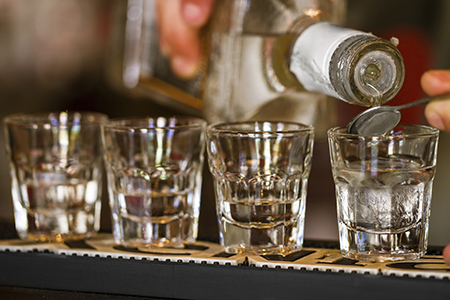The study was carried out on 280 young people, over two years, from the ages of 12 and 13
Scientists at the University of Liverpool have shown that young people who show impulsive tendencies are more prone to drinking heavily at an early age.
The research suggests that targeting personality traits, such as impulsivity, could potentially be a successful intervention in preventing adolescent drinking from developing into problems with alcohol in later life.
Studies in the UK show that approximately 24% of 12 year olds have reported at least one episode of alcohol consumption, rising to 77% of 15 year olds.
Impulsive behaviour linked to adolescent drinking
Previous research has suggested that impulsive behaviour is linked with adolescent drinking, but it is unclear whether young people who are impulsive tend to drink more, or whether drinking whilst the brain is still developing is particularly harmful and can lead to the progression of impulsive behaviours.
The team used computer tests that measured inhibitory control, the ability to delay gratification, and risk-taking. More than 280 young people who were aged 12 or 13 at the beginning of the study took part in the study. The participants repeated the computer tests every six months over the two years of the study.
Results showed that those participants who were more impulsive in the tests went on to drink more heavily or have problems with alcohol at a later time.
Professor Matt Field, from the University’s Institute of Psychology Health and Society, explains: “Young people in the UK are starting to drink alcohol at a younger age than in the past, and much of this reflects broad social trends. There are, however, significant differences in the age at which teenagers start to experiment with alcohol and the age at which they start drinking regularly.
“It is important to identify the psychological characteristics of adolescents who are likely to go on to drink heavily, because this can help us target alcohol prevention more effectively. In addition, we need to identify the consequences of heavy drinking during adolescence for health in general, and brain development in particular.
Prevention interventions
“Our results show that more impulsive individuals are more likely to start drinking heavily in the future compared to less impulsive individuals. The next steps are to take these results and apply them to prevention interventions that are tailored to individual characteristics, such as impulsivity.
“We also need to conduct studies where we follow-up young people for longer than the two years that we did in the present study. This will help us to understand whether heavy drinking over a longer period during adolescence has an impact on impulsive behaviour.”
The research, funded by the Medical Research Council (MRC), is published in the journal Addiction.
